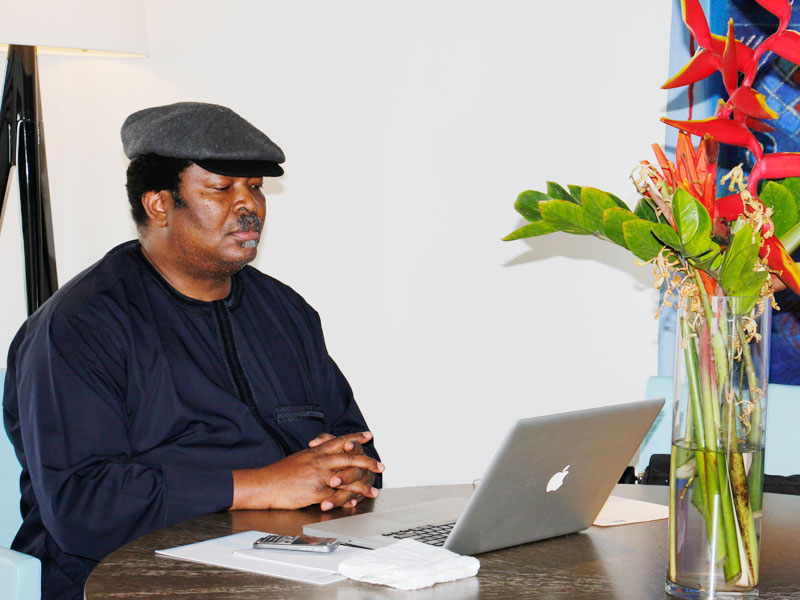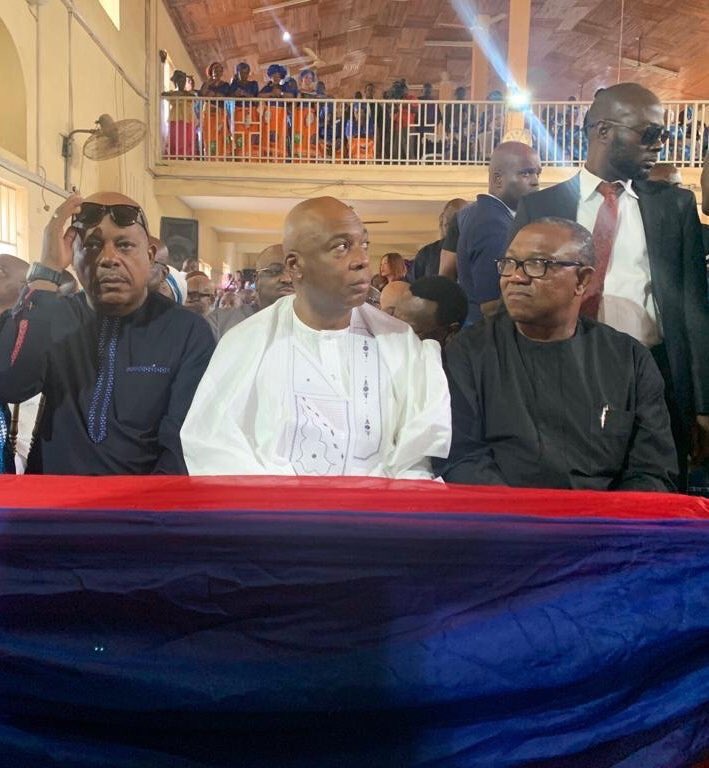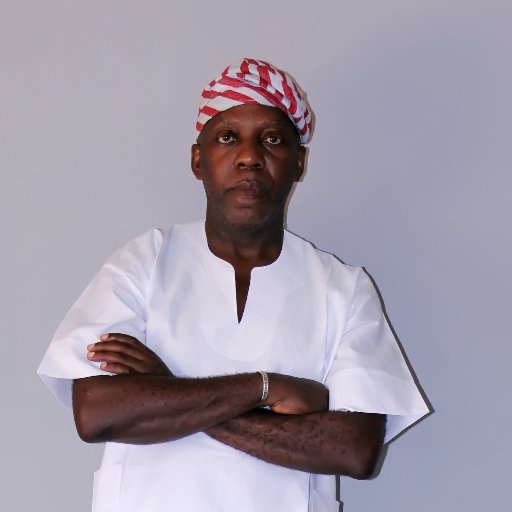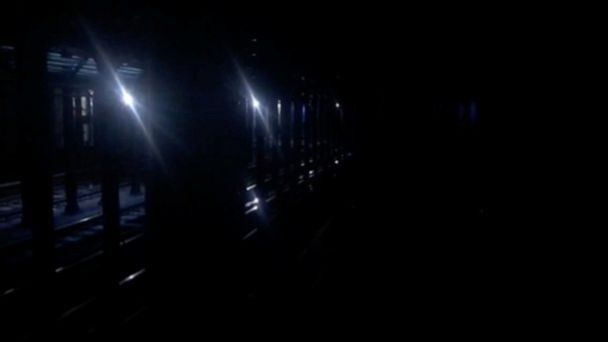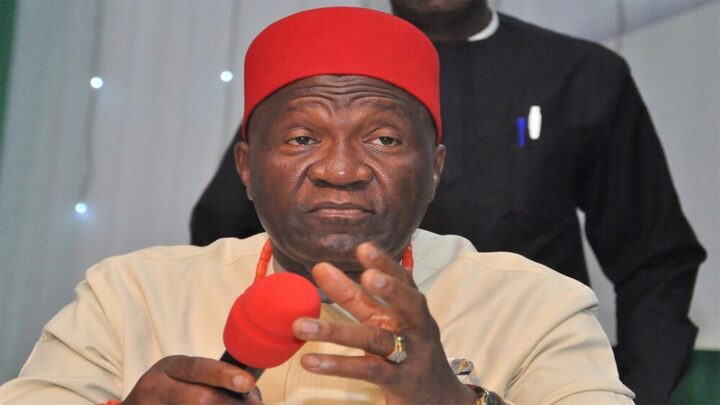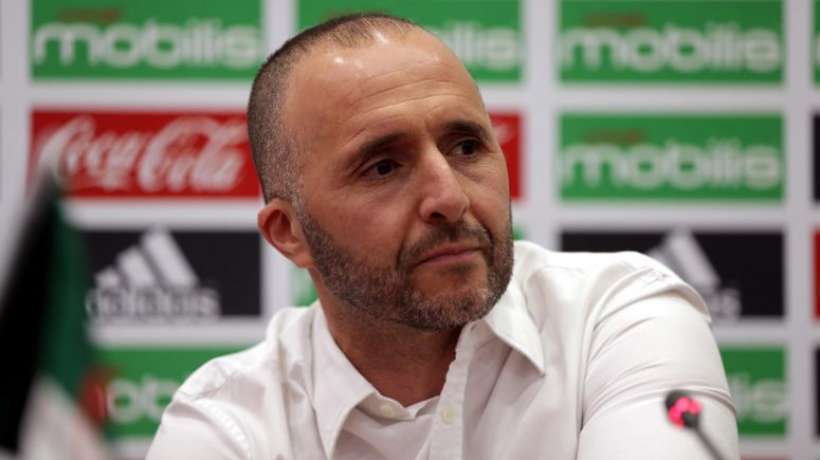Nduka Obaigbena, editor-in-chief and chairman, THISDAY Media Group/Arise TV Networks, says he cannot claim to be successful “until I get to the finish point”.
Obaigbena, who clocked 60 on Sunday, said this in an interview with his newspaper.
Speaking on his success story, Obaigbena said he was “not born with a silver spoon” but in his 20s, he was a young man “with lots of cash”.
Obaigbana said proceeds from drawing cartoons for the Nigerian Observer were used in buying his first car. He said that was during his days as a student of the University of Benin.
Advertisement
“Hard work is what leads to success and to be successful, you have to be a master of your circumstance. It is not what you do at the beginning that determines whether you will succeed, but how you end up. Your endpoint is at the very end. So, it is how you finish that is more important than how you started. So, it is what you accomplish at the end that matters the most,” Obaigbena said.
“Like Colin Powell said, it is easy to go to war, but what is your exit strategy? If you don’t plan your exit, you cannot start an entry. So, I cannot say I am successful yet until I get to the finish point. You cannot determine it; you take the punches as they come.
“I was not born with a silver spoon. I had to make my way through thick and thin. There is power in insight and experience is what guides decision-making.
Advertisement
“I had a cartoon column called Lekeleke for the Nigerian Observer, which made me a rich student. This was because the Nigerian Observer was paying me N10 per cartoon, and I was doing it every day, at this time I was already at University of Benin. I would leave the university, go and draw the cartoon and submit it and by the end of the month, they would pay and that enabled me to buy my first car as a student at UNIBEN.”
Commenting on some of his feats, Obaigbena said he was the one who held the last interview with Muhammadu Buhari in 1985 before he was toppled in a coup, and was the first to interview Ibrahim Babangida who took over as head of state.
“So, I did the last interview with Buhari and the first interview with IBB. All these happened when I was about 25 years old. So, I was a young man in my twenties with lots of cash,” he said.
Asked why he is not in politics, Obeigbana said “because it is not worth it”
Advertisement
Below is the full interview:
ON SUCCESS
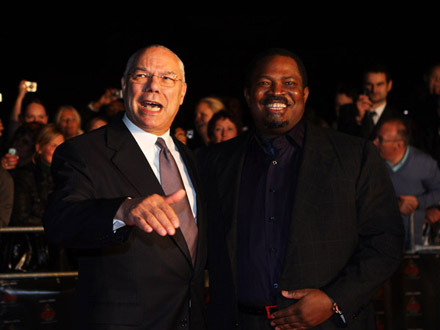
Success is in the eyes of the beholder; it is like happiness. But to be successful in whatever you have designed, that means you have accomplished your mission. You need a mission to achieve your goal. Hard work is what leads to success and to be successful, you have to be a master of your circumstance. It is not what you do at the beginning that determines whether you will succeed, but how you end up. Your end point is at the very end. So, it is how you finish that is more important than how you started. So, it is what you accomplish at the end that matters the most. Like Colin Powell said, it is easy to go to war, but what is your exit strategy? If you don’t plan your exit, you cannot start an entry. So, I cannot say I am successful yet until I get to the finish point. You cannot determine it; you take the as they come. Some people start very well, blaze the trail, but end up very poorly. It is a combination of circumstances – circumstances within your control and some beyond your control. It includes luck, it includes getting to a place at the right time, divine intervention and also many other things.
So, to be successful, you have to be a master of your circumstance. For instance, when we started THISWEEK, there was only one printing press in the whole of Nigeria that could print magazines, it was called Academy Press, and Academy Press was already printing for our competitor which was Newswatch and the market day for magazines was Monday, because you define the week ahead. So, if we went to Academy Press to say deliver for us on Tuesday or Wednesday, they would print for you, but by then it would have been us getting to the market mid-week. So, it meant that we had to find other ways of printing if we were to be in the magazine business. So, we decided to be printing in London. What it meant was that we wrote the magazines, Thursdays was our deadline, we used to fly out to London on same Thursday, landed on Friday, which was the day we used to take the pictures and artworks to the press for it to be printed on Saturday and delivered on Sunday morning and you take it to Heathrow, parcel it and plan for shipping Saturday night, for it to arrive on Sundays. Those days there was something called perishable clearing, so we could clear on the tarmac. So, it was possible to clear the newspapers at the tarmac because magazines’ have a life span and they were treated like eggs or day oil chicks. So, we cleared the magazines either on Sunday morning as it were and they would be ready to be distributed everywhere in the country.
Advertisement
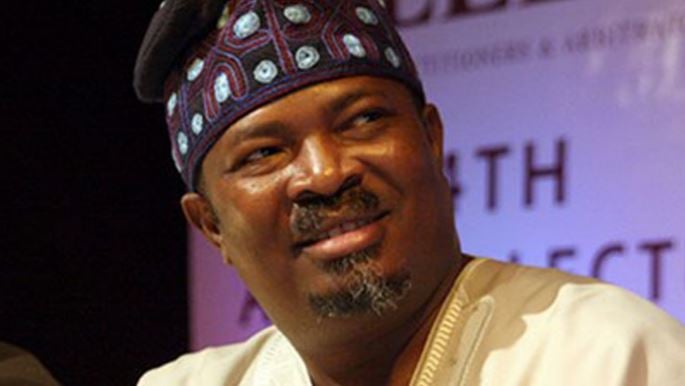
So, by Monday morning the magazines would be everywhere in the country and that was how we were able to challenge Newswatch and that got the late Dele Giwa infuriated and then the competition started. So, those were the circumstances then. Then, a few months into that endeavor, we had this debate on whether Nigeria should take the International Monetary Fund (IMF) loans which came with conditionalities. So when General Ibrahim Babangida decided to work with the IMF, it meant that we had to devalue the naira; so we then set up what was called the Second-tier Foreign Exchange Market (SFEM). I remember the blackboard on that day the policy took off, the naira which we were buying at about 80 kobo to a dollar, fell to N3.32 to a dollar on the first day, which was a depreciation by over 300 per cent. This made our cost of operation to immediately increase by over 300 per cent, due to the action of the government, but your revenue remained the same. We did not increase our cover price, we endured, tried to raise money because I had a strong board, but the naira progressively depreciated. Eventually computers came in and we started making use of them which meant production processes were enhanced. By 1992, it became clear that it was not sustainable to continue printing abroad because every day the naira kept depreciating, so we could only play catch up. So, the introduction computers in those days was a game changer in terms of the magazine business. We looked at the scenario then and knew that the future of magazines in Nigeria was going to be numbered. That was why we registered Leaders and Company in 1992. I appointed Dele Momodu as the editor and some other persons to start Leaders and Company and that was how we founded THISDAY as a daily newspaper. As at today, all the magazines that existed as at that time are no longer in existence, but we are still here. We transited from THISWEEK to THISDAY.
WHY MEDIA BUSINESS
I was always into the media. Those days when I was in Government College Ughelli, which was the time of the black consciousness, I formed a group called the Black Cultural movement and we campaigned at that time in 1976, few years after the Sharpeville massacre in South Africa. We started campaigning for South Africa’s independence when we were in Secondary School. I remember the federal government launched what was called the South African Appeal Fund, under the then Chief F.S. Edo Osagie, the multi-billionaire. We organised events to raise money for South Africa doing rag days and all that in secondary school. I was a follower of the likes of Malcom X and other black icons. Thus, we started a school magazine called Chindava, which we used to awaken black consciousness in our school. I remember in 1976, the Principal then looked at our first publication and said it was not very good, and then we did another publication and he said ‘better, but not good.’ That was in 1976. So, I left Ughelli College in 1977 and started cartooning for the Nigerian Observer. I had a cartoon column called Lekeleke for the Nigerian Observer, which made me a rich student. This was because the Nigerian Observer was paying me N10 per cartoon, and I was doing it every day, at this time I was already at University of Benin. I would leave the university, go and draw the cartoon and submit it and by the end of the month, they would pay and that enabled me to buy my first car as a student at UNIBEN. What then happened was that the military removed the editor of the Nigerian Observer, Chuks Okuwa, who was a good friend of mine and I left the organisation with him. That led to both of us co-founding the The Dawn Magazine in Benin City, which existed for few years such that while I was Coordinating Editor, he was the Editor-in -Chief. When I graduated I was posted to the Dawn Magazine to do my National Youth Service and I also employed about five persons who were also doing their National Youth Service Corps at The Dawn. The circulation of The Dawn then was about 5,000. After I left The Dawn, I went to London and then I got introduced to Nigerian Advertising because at that time advertising in Nigeria was controlled by nationals of UK, and at the time airport advertising was very lucrative. That was how I met the likes of Alhaji Lai Mohammed, who was the Public Relations Manager of the Nigerian Airport Authority at that time. He used to give us adverts then because advertising is the key of publishing. So, because I studied Creative Arts with combined honours in Fine Art and English, I was able to create what I wanted, like creating my own designs.
Advertisement
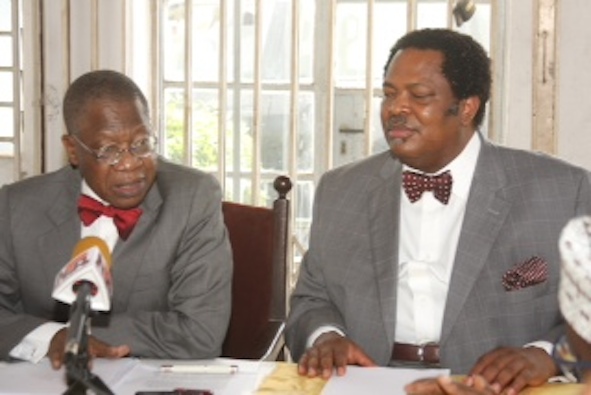
I then joined a company called the Nigerian Advertising Limited, when I graduated in 1982, in London. This was all still before the naira devaluation. Then, the Nigerian Advertising Limited was a very strong agency which aggregated foreign advertising into Nigerian market; so we stayed in London and captured advertising using it for outdoor across Nigeria, in areas such as the airports, lounges and everywhere. So, whilst I was with Nigerian Advertising Limited I got introduced into the world of advertising and was eventually engaged as a consultant for Michael Jarvis and Partners as a researcher on the Nigerian market. They were consultants to advertisers and consultants to media. That was how I got introduced to Time Magazine whose biggest market then was Nigeria. They used to publish one 150,000 copies weekly, selling Time Magazine in Nigeria. In Nigeria, Time Magazine and Newsweek were major clients of Michael Jarvis and partners and I was writing the consultancy to get them adverts from the Nigerian market. That was how I got introduced to Time and Newsweek. But I preferred Time Magazine, which was why I applied to work with them, but Newsweek hired me first. So, I went to New York to work with Newsweek and within a month, I got the offer from Time Magazine. So, I left Newsweek Immediately and joined Time Magazine and I started helping them to develop special sections which was the combination of advertising and editorial, both of which I had the proficiency and skills for because of my background. We developed special sections on Morocco and Zimbabwe and other countries. At the time, Nigeria was going to celebrate its 25th Independence anniversary, I proposed a major special edition on Nigeria at 25, which was perhaps the most successful special section we did. We actually had to plan for it ahead and incidentally, the Head of State at that time was Muhammadu Buhari.
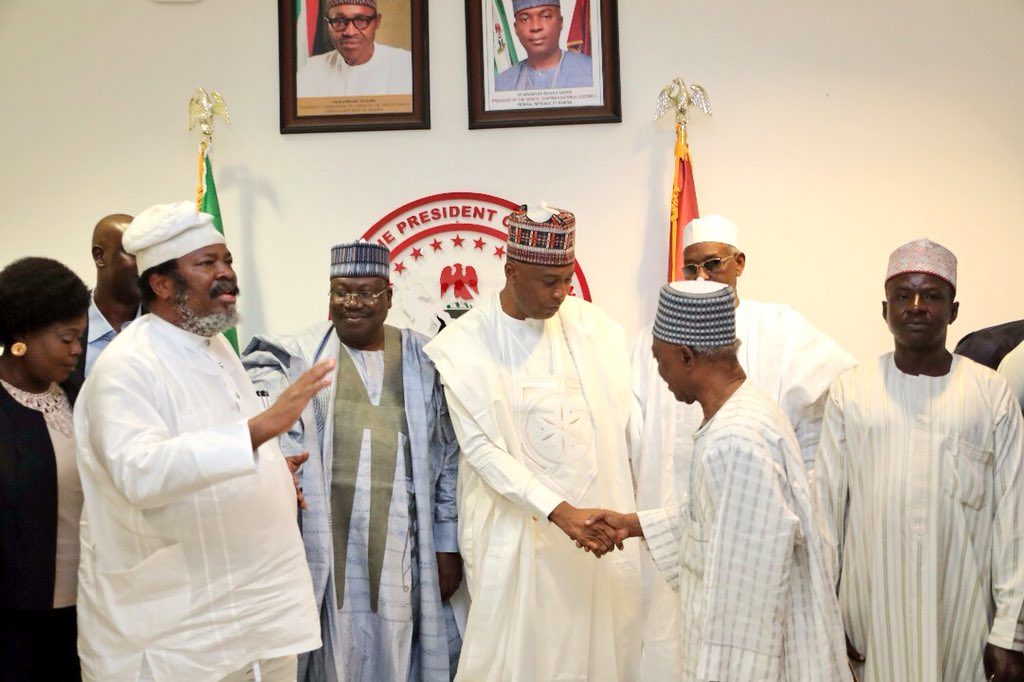
So, I became close to his Chief Press Secretary. So, we started planning the special section. So, by August 1985, I did an interview with Buhari who was to be on the cover for the October 1985 edition. I finished the interview with Buhari and I flew to New York to start the production. It was while I was in New York and the interview had passed editorial checks that I got a call that he had just been overthrown from power. I was the last person that interviewed Buhari before he was removed and I was in shock because Buhari had just approved our payment and in that approval, I was to make $250,000 as commission because it was a global edition that was going to be circulated all over the world. I phoned the villa and they said there had been a coup and General Babangida had taken over. So, I flew back into Nigeria and met with Babangida, which meant we had to also do the first major interview with him as the Head of State. So, I did the last interview with Buhari and the first interview with IBB. All these happened when I was about 25 years old. So, I was a young man in my twenties with lots of cash. We then published that edition of the magazine and the board of Time Warner Group then hosted Nigeria in New York on the pent House of Time building and invited the US elites to celebrate Nigeria. So, Babangida sent a delegation from Nigeria headed by Air Vice Marshall Ishaya Shekari, Brigadier Anthony Ukpo, who was the Minister of Information, Wada Maida, Abba Dabo and others, who were part of the celebration. Also black leaders like Andrew young, Jessie Jackson and all other black leaders were present at the event which became very successful in New York. That event sort of put a stamp on my career at that time. With that success as a young man with a lot of cash instead of buying cars and the likes, I decided to start a magazine to compete with Time Magazine, even though I was still there. I wanted to tell the Nigerian story. Time was doing it for commercial purposes, not for strict editorial. So, we decided to start a magazine called THISWEEK. Prior to that, the only magazine in existence was Newswatch. But after that Time Magazine event on Nigeria in New York, we did another one in 1986 did for Morocco and Zimbabwe. So, with all that I had enough capital, but I did not want to go on the journey alone. So, I approached Gamaliel Onosede, who was a board room guru and also an old student of Government College Ughelli and his sons were my school mates. Then, we put together a board to drive THISWEEK. I also invited my friend and mentor then, Professor Kwaku Adadevoh, who had just left the position of Vice Chancellor of the University of Lagos, who I met in Maiduguri, while working with the Time. We also had Arthur Mbanefo who was the leading Accountant then, we had Chief Hope Harriman, who was an accomplished business man; Audu Ogbeh, who I had known during my journalism days, I used to visit him in Benue and he was the youngest Minister under Shagari. There was also Abba Dabo and Chinua Achebe, who eventually he sent his wife, Christy Achebe to represent him on the board, but he was part of the team. So, with that strong board, we launched, but at the end of the day, all of those men, as great as they were, they had the names but magazine requires money. But they were very great in opening doors. So, up until the time of the devaluation we were fine, but the naira devaluation changed everything, which meant we had to start raising capital and we could not harass them (the board members), for money. So when I got my next payment from Time Magazine, I was about 27 years old, I bought myself a Mercedes Benz V Boot and then moved to Ikoyi. I said to myself, instead of spending on magazines every day, at least live some good life. So, when the crises started after the naira devaluation, I started Leaders and Company. That was how Dele Momodu came in and I bought him a brand new Peugeot 504, I was still into politics then from the side because being close to Babangida and co, I was into politics and was the Special Adviser to the then Chairman National Republican Convention (NRC). It was from that we now founded THISDAY.
Advertisement
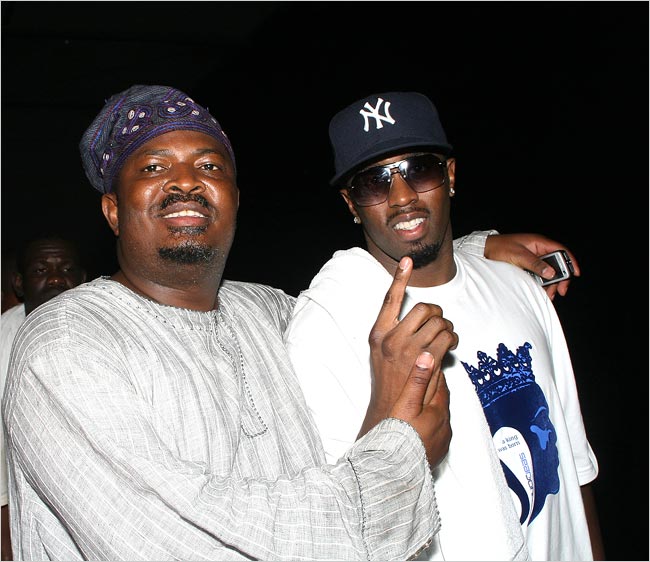
INITIAL CAPITAL FOR THISWEEK
The capital of THISWEEK Limited was N100,000, from that amount I brought N13,000, which was 13 per cent per cent of the whole shares, we then kept five per cent for staff and the other board members shared the remaining. So, we were okay and because I was still earning money from Time magazine I was able to support the business. But once devaluation occurred and the fundamentals changed there was little they could do to bring money because they were not money bags, they had ideas, and opened doors, but they did not have money. At the initial stage, they all bought their shares, but they did not want to expand. For instance, when Hope Harriman said the problem of this board is equity, they said because he had money he wanted to buy them out. So, nobody wanted to reduce his holding and therefore it was difficult. Even me, I could not put more than that per cent even if I had it, because the other shareholders did not want to be diluted, they had had six percent each which was how we got to that situation. So when I founded THISDAY I did not seek the consent of anybody, I own 99 per cent of it and added one of my children as the remaining one per cent with the mentality that if it fails I would be responsible for it and if it thrives I would also be responsible for it.
THE DAWN MAGAZINE
When I graduated I went to London and later on the Editor-in-Chief ended up working for me as the Managing Editor of THISWeek.
Advertisement
WHY PREPARATION MATTERS
Publishing is a tough business in Nigeria. Unlike now when you can form any name online and wait for Google alert, of $10,000, publishing requires preparation. You must understand the business before going into it.
WORKING WITH TIME MAGAZINE AND OWNING A NEWSPAPER
I told them I was going to set up my own magazine, but they kept me there because I was opening doors for them. The Nigeria event continued for many years, Zimbabwe, and we even did something for Kenya and Morocco, and those were the key clients. It went from editorial and commercial works to just commercial at some point. I was there till when we started Style, I was there when they founded CNN, all of that was part of those Time era. So, Time Inc. merged with Warner Brothers. Warner Brothers was more into production of movies than print even if Time Inc. still had a thriving print business, such as In Style, Sports Illustrated, Fortune and many others. But with the advent of the internet, magazine sizes kept reducing, but they were earning more from movies as Time. Then they merged with CNN and bought Tech Toner who they then invited on the board of Time Inc. But the World Wide Web changed the story for everybody.
CHILDHOOD AND FAMILY BACKGROUND
I came from a strict Christian family, my dad was a civil servant, and I was born at the University College Hospital, Ibadan, so I have a proper birth certificate and not an affidavit. My dad was a Senior Civil servant on the executive cadre, he had a 403 in the sixties, and he was a world war veteran that fought in the second world war. My mum was then a chief nursing officer in the then Mid-west state. My dad ensured we went to good schools, he ensured he paid for good schools. My three brothers schooled abroad but I refused to go abroad. I chose to stay here in Nigeria. Although I used to travel abroad to visit, which led to me becoming friends to Chief M.K.O Abiola from plane rides, we used to enter British Caledonian Airways then and fly into London together. We did not need visa then; all they did was stamp your passport on arrival at the airport. So, after a while, Abiola started wondering who was the small boy that was always flying on the plane with him and that was how I got close to him. I and Abiola had some interesting projects together; I remember he gave me a cheque of N1 million then and I went to Habib Bank to withdraw the money and that was how I became close to Kekere Ekun. As the bank CEO, he called Chief Abiola to confirm the cheque and that was how I became close to Kekere Ekun as well.
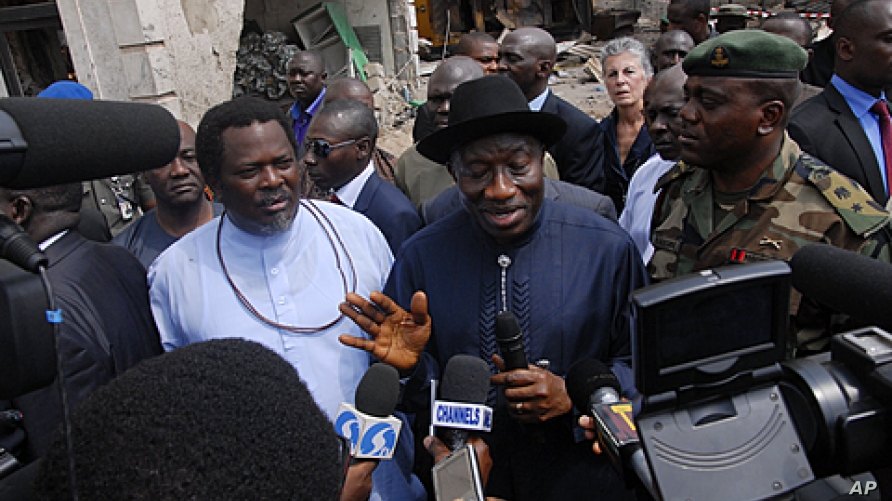
FORMATIVE YEARS OF THISDAY
Essentially, we tried to use a lot of technology. Presentation is a key factor in journalism. If you do not present it well it cannot work. We were the only newspaper in the history of Nigeria to start without a printing press. The idea of the newspaper was to change the vision about Nigeria. My niche has always been politics, business and back of the book. Business drives everything and Politics leads.
GREAT STORIES THAT STOOD OUT
Our biggest story which I liked was the Awolowo story. One day, I got a call when I was doing THISWEEK from the late Bisi Onabanjo, who was Governor of Ogun State at that time. He said he wanted to write for THISWEEK, a column called Ayekoto. So he was writing the column and made us to become close. So, anytime I drove to Benin, I would stop at Ijebu Ode to visit him at his house and he used to take me to Chief Awolowo’s house. So, I got close to the Awolowo’s at that time and you would always see Chief Adebanjo and all those Awolowo followers around. Whenever I was coming back to Lagos from Benin I also used to stop at late Onabanjo’s house, who would then again take me to Chief Awolowo’s house, and that was how I became close to Segun Awolowo. Vice President Osibanjo’s wife was quite young then, but I got close to the grand children of Awolowo because we were in the same generation. Eventually when Awolowo died, we were the first to know. So I remember we just bought three 504 cars for THISWEEK. So I deployed a team led by Tunji Ladner to go and cover it and we covered the Awolowo series. I remember that edition, ‘If not me who?’ But the biggest miracle came with printing. Awolowo was being buried on Saturday, our printing day was Friday night, our flight day was on Saturday night so that we can distribute on Sunday, so the magazine would be everywhere on Monday morning. So we covered the funeral which was one of the biggest stories at the time. So, we had a team coming from Ikene, so we wrote the story on that Saturday and caught the Nigerian Airways flight that night, we left around 9pm that Saturday night, while the burial finished around 3pm, then the photographers all came back, printed their pictures, we wrote the story, produced and got everything ready for the 9pm flight. Someone travelled and made sure the production was finished on the plane. So, we arrived London on Sunday morning because we had told the press how important it was, they were able to turn it for us that Sunday. We did the lithography, printing and finished about 6pm and moved straight to Nigerian Airways and we landed on Monday morning, cleared the magazine on the tarmac and went straight to Kakawa and when everybody opened the magazine on Monday morning and saw how bright and colorful it was –an event on Saturday, in colour on Monday morning – that immediately won us the hearts of everybody. That was one major edition I remain proud of till tomorrow. Technology, flight logistics and everything, it wasn’t easy.
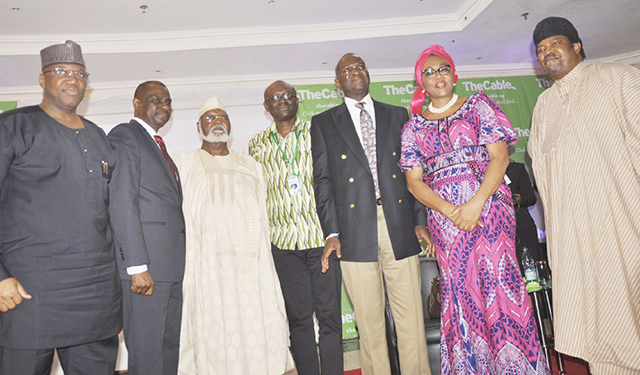
DRIVING FORCE
It’s competition. We battled Newswatch and then I took their best. I took Lawson Omokhodion, who was their business editor; Tunji Ladner joined us, and then we added Emeka Anuko and co. We just raided Newswatch and took their best. We also took people from The Guardian, The Democrat and other strong newspapers.
EYES FOR TALENT
Journalism is about people. There is a book I read which made me to understand that to succeed in journalism, you have to grow your own editors. What we did was that we had the top guys and we had new entrance, who were nothing. So, we grew them. The top experience guys mentored and grew the young guys, so there was no middle. So, the young guys aspired to grow to the middle level. So the issue of going to the top was not an issue as it became easy. So, you grow your own editor.
ARISE TELEVISION
Media is evolving and changing; newspapers are transforming, but there is a convergence on video and everything is going digital. So, in doing Arise TV, it means we are in the fore front of that convergence, it is the same story we tell, but using visuals.
THISDAY EVENTS
Journalism and events go together. We did the biggest music festival till today, the THISDAY Music festival, nobody has done it that big till today. We had Jay-Z, Beyonce, Snoop Dog, Rihanna, everybody was here. Concerning THISDAY awards, we would still do it, I just decided to slowed down. We were the pioneers of selling executive tables at events which everyone is doing now, also we were the first to do tents, in addition to that we were the first to do back page for opinions and sport. So, whatever we do, people follow. And we shifted the mast head and had the window column and wrap around and everybody followed. Shifting our mast head meant vendors had to start putting our newspaper in front, which meant everywhere at that time would find our paper in the front. Even the wrap around, when we started it, The Guardian initially said they would never do it, that it was killing journalism, but they later did. I learnt that from Time Magazine in New York. I did it first with newspaper, I did it with Guaranty Trust Bank in Lagos, and MTN in South Africa, which we printed the paper in yellow. There was the wrap around but the entire paper had a yellow theme the official color of MTN; which caused a steer. I was in advertising; I was an advertising researcher so I combined all the knowledge. I worked with Michael Jarvis, so I was a researcher on media globally on what and how advertisers should present themselves. It was that combination of advertising, journalism and creativity that gave us an edge.
FRIENDSHIP WITH POLITICIANS
I got into politics reluctantly but I left soon after. Recently I attended the British High Commission dinner and I was one of the oldest people there. I saw some of the new senators and young members of the National Assembly getting excited. But for me, I have seen it all, so I just sat down quietly and was watching them all.
WHY NOT IN POLITICS
Because it is not worth it. When you say hello you pay, when they say hello you pay twice. That is, when you go greet someone, you pay, when they come to your house to visit you, you pay twice. The day I decided to leave politics, I got home and met people waiting for me in my room, because there was no space to sit again so they sat in my bedroom; I drove them out of my house. Although I went to the constitutional conference, i was elected fully and it was a great event. We had Yar’Adua, Ojukwu, Ekwueme and everybody. That was when we did the first edition of THISDAY. I remember that first day when I distributed the newspaper edition at the conference, everyone had a copy and it was after that the first coup happened; Yaradua was reading and got arrested two days after. Before then because I was with NRC at the strategic level, NRC and SDP made me secretary of the NRC-SDP joint committee. So, we put together the founding of the interim government. We negotiated the exit of the military government. I attended all those meetings and because THISWEEK was transiting into THISDAY and we were yet to start publishing, I became the source to The Guardian concerning all their key front page stories that time. We just finished This Week at this time, I just entered politics briefly and I was transiting into THISDAY so there was no THISWEEK at that time. The Guardian was the only paper I could use so was giving them all the hard-hitting stories through Emeka Izeze.

LISTING THISDAY GROUP ON THE STOCK MARKET
We tried to be listed after what South Africa, we appointed IBTC as the issuing house then, we sat down and looked at it back then in 2008 and there was the financial crisis. But my good friend, late Tayo Aderinokun looked at it in details, then the market was falling, so he said it was not the right time to get listed and ever since then, the economy has not recovered. Before 2008, you can get listed and it was a different thing. If the time comes for that, fine, we would. But getting listed is only one way there are other ways. And also the brand is strong. The TV station and the newspaper is getting stronger; with that combination you can take over the world. That is why I said grow your own editors, and we are growing younger people today across all our platforms.
HOW TO FACE FAILURE
Failure is part of life, we fail all the time, but how you react when you fail is very important. THISWEEK failed. But when you fail you get back on your feet and try harder, it is not a big deal.
ON FEAR
I am afraid of only God and nothing else. You just keep moving regardless of the challenges.
ON FORESIGHT AND INDUSTRY LEADERSHIP
Intuition and studying the market. In those days, at Time Magazine, where I used to work, the US edition used to be over 100 pages filled with adverts, so once the computers came in it reduced. The media started to look for new ways to adapt, then on the back of the computer came the world wide web. At THISWEEK, we were not comfortable with the circumstance which was the devaluation of the currency. So, we had to adapt instead of dying and transformed into a daily newspaper. Those magazines that did not adapt ended up closing up. They failed to read the future.
WHAT TO DO DIFFERENTLY
There is nothing to do differently because I was not born with a silver spoon. I had to make my way through thick and thin. There is power in insight and experience is what guides decision-making. You can say if you had done it this way this and that would have happened. Nobody knew in 1987 that we were going to devalue the naira or that Babangida would accept the IMF loan, or that there would be a coup. So, there is nothing to do differently.
Add a comment

